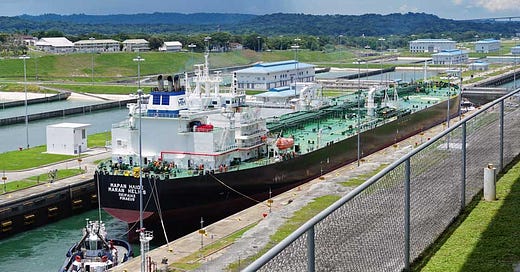Ports, Power, and Politics: Behind the High-Stakes Battle Over CK Hutchison’s Panama Deal

ByAlonso E. Illueca
This week, a multibillion-dollar deal was set to shift control of some 43 ports across 23 countries—but now, it’s at the center of an escalating geopolitical battle. The agreement between Hong Kong-based conglomerate CK Hutchison and a U.S.-led consortium spearheaded by investment giant BlackRock included key facilities like the Balboa and Cristobal ports, located at the Pacific and Caribbean entrances of the Panama Canal, respectively. Both ports have been central to U.S. President Donald Trump’s criticism of Panama, serving as fodder for his inflammatory rhetoric and unsubstantiated claim that China controls the Panama Canal.
The deal—particularly because of the inclusion of the Panama Ports—has also sparked strong criticism in both Beijing and Hong Kong, casting doubt on the future of the transaction. Chinese officials have openly characterized the deal as a betrayal, arguing that, if concluded, it would weaken China’s influence over key shipping routes. China’s Foreign Ministry spokesperson, Guo Jiakun, has characterized the deal as “economic coercion.”
In light of this, Hong Kong’s leader, John Lee, has also declared that “any transaction must comply with legal and regulatory requirements” and that the matter would be dealt with “in accordance with the law.” Meanwhile, Ta Kung Pao, a Hong Kong newspaper with ties to the Chinese Communist Party, has issued statements reinforcing concerns over the deal. Together, these reactions suggest that Beijing is seriously considering the outcome of the transaction and that it may take steps to prevent it.
Hong Kong Law
These new developments have resurfaced the debate around the implementation of the national security law in Hong Kong, which sparked widespread protests in 2019 and 2020. Many deemed the law as a breach of the 1984 Sino-British Joint Declaration, a binding treaty that supposedly guaranteed autonomy for Hong Kong after its handover to China in 1997 and was intended to preserve the status quo until 2047. In this case, articles 31 and 37 of the national security law allow for its application to companies. Although CK Hutchison is registered in the Cayman Islands and its owner, Li Kai-Shing, has moved most of its assets to Canada, both China and Hong Kong still retain some leverage.
There are reports of ongoing talks to find “a reasonable way out” of the current situation, accompanied by a pause in new collaborations between Chinese state-owned companies and CK Hutchison. Given the broad interpretation of “safeguarding national security,” the principle that guides the Hong Kong national security law, Beijing and Hong Kong could argue that the CK Hutchison-BlackRock deal threatens China’s national security and warrants intervention from the State to safeguard it.
Chinese Law
Moreover, Ta Kung Pao called for applying China’s Anti-Foreign Sanctions Law against CK Hutchison, which allows Beijing to impose countermeasures on foreign entities that enforce sanctions or harm China’s interests and has advocated for punitive measures if the deal goes forward. The newspaper also invoked Hong Kong’s National Security Ordinance, further signaling potential legal challenges.
In sum, if China wants to prevent the deal from happening, it certainly has the tools to do so. Nonetheless, such actions would vindicate—in part—Trump and his team’s claim that China could potentially instrumentalize CK Hutchison’s position in Panama to influence the Panama Canal operations. The Chinese government’s intervention to prevent the transaction with the aim of safeguarding its national security and interests would also mean the end of Hong Kong’s autonomy in all but name.
On March 28, 2025, China’s market regulator, the State Administration for Market Regulation, announced that the deal is now under legal review in order to protect safe competition and safeguard the public interest, a vetting process that has postponed the closing of the deal.
Panamanian Law
Most importantly, CK Hutchison’s operations at the Balboa and Cristobal ports carry additional risks. Aside from the BlackRock deal, both ports are currently under an audit from Panama’s Comptroller General, and there is a pending Panamanian Supreme Court decision on the constitutionality of both ports’ concessions. This means that CK Hutchison’s legal problems in Panama could be transferred to BlackRock and its partners.
Meanwhile, if China blocks the deal and Panama’s legal rulings and audit go against CK Hutchison, the company could find itself with no ports and no income. In that event, a lengthy arbitration between CK Hutchison and Panama would likely follow, similar to the one currently underway between Isla Margarita, Landbridge Group, and the Panama Colón Container Terminal.
In any deal, particularly one of this kind, time is of the essence. If the deal proceeds, CK Hutchison would cut its losses in the face of U.S. geopolitical pressure and hegemony in the region. Moreover, if this buyout strategy succeeds, other U.S. companies could try to replicate it in other areas of concern in Panama, where China is present, such as the copper mine in Donoso. However, if the deal fails, U.S.-China geopolitical tensions could scale up, with Panama as a key battleground.
Alonso E. Illueca is a non-resident fellow for Latin America and the Caribbean with The China-Global South Project




